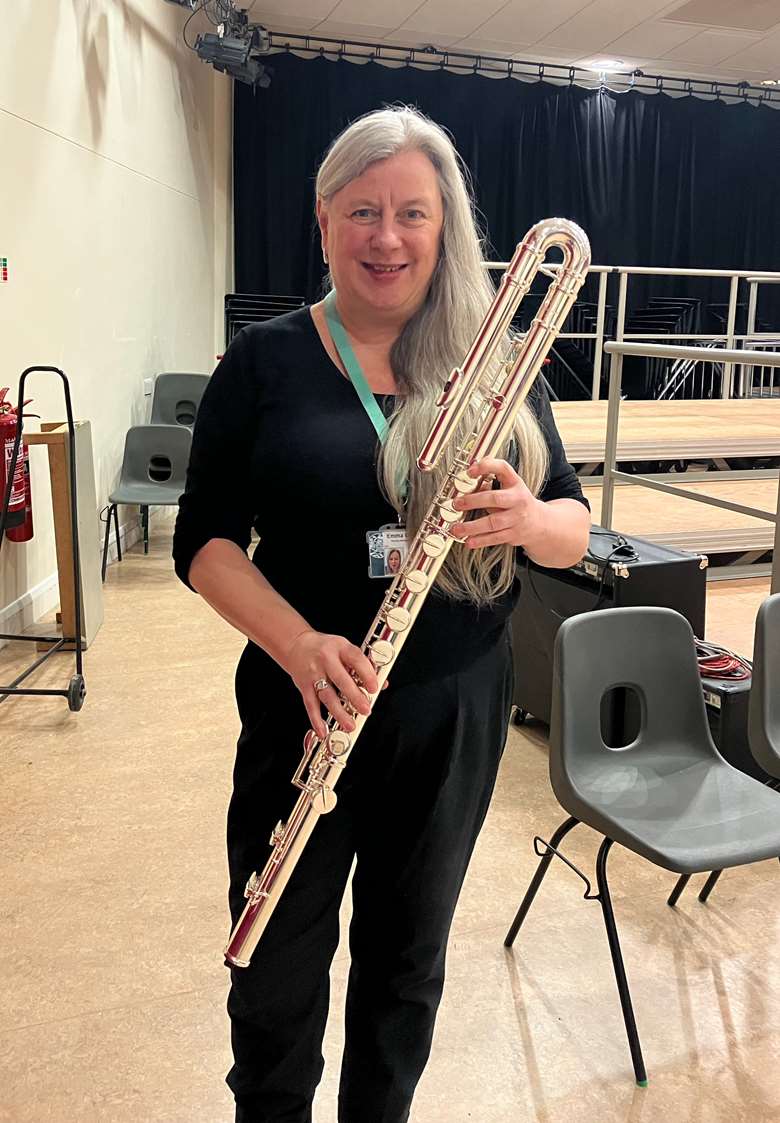Music hubs: a view from the bridge
Phil Croydon
Monday, January 1, 2024
With new Hub Lead Organisations looming, music education providers are re-grouping ahead of September 2024, when hubs will serve wider geographic areas. MT's Phil Croydon reports from Oxfordshire's Music Service to learn of its preparations.

Courtesy Emma Coulthard
I am at the Centre for Music, Headington, where Oxfordshire's school symphony orchestras and wind orchestras (and over 200 young musicians) meet regularly on Saturday mornings. It's also the operational home of the county's Music Service, which supports schools through curriculum delivery, weekly singing sessions, WCET (brass, wind, strings, plucked strings, djembe, folk music) and music for wellbeing. The hub serves around 280 schools across the county, and runs area network meetings for teachers and large-scale performances.
I'm meeting the head of music service, Emma Coulthard, who's been in post since October 2021. Coulthard was previously head of music service for Cardiff county and the Vale of Glamorgan, and is a working musician as well as hub leader.
The Music Service is about to join forces with Buckinghamshire Music Trust (BMT) as part of the reshuffle and ACE's Music Hub Investment Programme. Designed to serve a much bigger catchment area, such re-organisation ‘means teachers will be able to collaborate with, and learn from, a broader network of music education professionals, and have access to a wider range of career development opportunities’, according to Hannah Fouracre, director of music education at ACE (see p. 12 of this issue).
Current progress
I ask Coulthard for her thoughts on the re-organisation and process, from her unique perspective: ‘It wasn't a natural move in the minds of some’, she admits, referring to joining BMT. ‘We sent back reports saying that we didn't think it was necessarily advantageous, particularly as the Oxford hub already had over 300 schools’. (In hub terms, Oxfordshire's Music Service is large.) But there were other, more structural reasons why the marriage seemed unnatural: the Music Service is part of a local authority, a county council, whereas BMT is a trust, a charity.
‘However well the two organisations are used to collaborating’, explained Coulthard, ‘getting all of that sensibly through the legal process in the time given is a real challenge’. There were also operational differences, including staff terms and conditions and pay scales. ‘Just from the point of view of governance and resource, to put that together rather than focus on delivery is a challenge for everybody’, she admits.
Generally speaking, it's not uncommon for hubs to feel that ACE's schedule for establishing Hub Lead Organisations is ambitious (to say the least). Scheduling aside, it comes on the back of the global pandemic, industrial action in schools, and repeated underfunding in real terms of music services. Resources were already stretched, and there are current, ongoing commitments to consider. Time-scale, however, like geography and size (or which activities organisations were allowed to bid for) wasn't up for negotiation: ‘You had to sort things out among yourselves’, explained Coulthard, referring to ‘how’ this would work.
The two services did sort things out and put in a collaborative bid, having made their feelings known during a consultation in March. ‘We're perfectly happy to do whatever is necessary for the sake of moving things forward’, Coulthard explained. This includes accepting BMT as the leading organisation – ‘in the end, one manager had to fill in the form. Fortunately, we have an extremely good relationship with our colleagues in Buckinghamshire’.
Going forward, there's to be a supervisory board for the new super hub; one based on dialogue, agreeing parameters and deciding what's important to keep separate, according to local needs.
Coulthard accepts that ACE's Performance Framework – for helping organisations identify strengths, weakness and synergies – was an effective tool. It provided a set of criteria ‘that we would have to meet anyway’, but brought certain reflection: ‘It was interesting to find out about somebody else's perspective, practice and local priorities’. To this extent, we could both see where ACE was coming from.
Workforce
‘It's really important to maintain wellbeing and mental health through all this’, said Coulthard, as we turned our attention to the Oxfordshire team. With any change, there's always concern, ‘but you have to bear in mind how staff are going to feel, not knowing things from the inside’, she adds.
I ask if ACE or the DfE have given advice on this. ‘I don't think, in the haste, it's been a priority. In Oxfordshire, as in all local authorities, there is challenge; but there's a huge emphasis on wellbeing in every meeting with senior leadership. But here [during the hub process], it hasn't been paramount. I don't think that's deliberate. But it's what happens when you rush something in very quickly; you can forget how people feel.’
Recruitment (and retention, in a lesser way) has become a challenge for the service, partly because of what lies ahead. It doesn't help that there's ‘a perception of instability in the sector’, Coulthard explained, ‘or that it [being a VMT] isn't a viable career choice – just at a time when it should be’.
We acknowledge, at this point, the NPME's ambition for ‘a skilled and dynamic workforce’. Coulthard also referred to competition for staff from schools, which can be perceived as ‘more stable’, and how people are taking fewer risks professionally these days.
She agreed, too, that there may be a longer-term problem with the supply of teachers, with third-level music departments closing and music student numbers falling. ‘We've noticed schools are struggling to recruit heads of music’, Coulthard confided. I found this surprising for a county more advantaged than most. It must have a considerable draw.
A bigger, longer-term challenge, though, is the unfunded rising teachers' pay and pension contributions, which is putting many music hubs at risk. Unless this is resolved through adequate central funding, it's hard to see how future plans can be resourced. In some ways, this argument has been running for 10 years, explained Coulthard, as budgets in real terms have been shrinking.
It's been reported that these financial pressures are hindering the NPME's drive for inclusion and diversity, to provide an equitable music education. ‘To increase the amount of support you give people requires increased funding’, suggested Coulthard, when discussing disadvantaged areas of the county.
Partners
It's common knowledge that Oxfordshire is well served for independent schools, who some see as the competition because of their facilities and impressive provision. For state-educated pupils in the area, however, the impact of certain schools has been ‘fantastic’ in the eyes of Coulthard.
An example is Music Flood, a cross-sector partnership for a community of 25 primary and secondary schools in Abingdon and Didcot, supported by Radley College, Abingdon Music Centre and an education partnership. Radley has been a driving force, ‘an example of good practice’, under the leadership of Radley's Sam Gladstone, ‘a kind of one-man mission’.
According to its website, Music Flood recognises the ‘inequalities in funding, training, confidence and provision for music in schools’; Radley also recognises the value in having its students work alongside children with different life experiences. Their approach extends to checking in with the Music Service on what's needed and where, and working with children with SEN. While giving every school an experience of live music, the approach is collaborative, sensitive.
One of the most exciting opportunities, Coulthard explained, has come from working with others in communities less likely to have engaged. ‘Using the Community Profile information, the service can identify these areas, and work with partners such as the City Council, Oxford Contemporary, and our local Barton Community organisation to bid for additional funding. The focus is on issues such as wellbeing, families and youth engagement, using music as the catalyst.’
Final thoughts
It's clear that Coulthard sees great opportunity in such partnerships and fully supports the NPME and its goals. The NPME is welcomed more widely, Coulthard believes, and with a realistic level of support and funding it has the potential to transform music education in England. There is a skilled and willing workforce among the hubs that is ready to make this happen.








